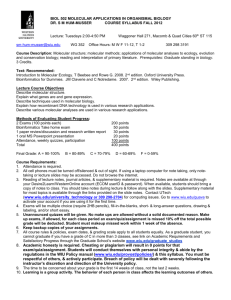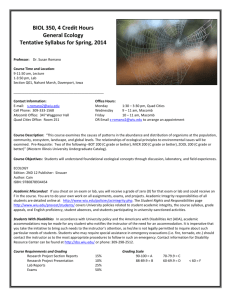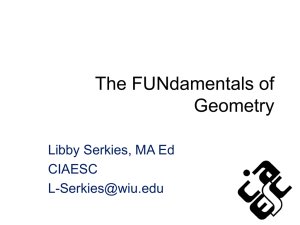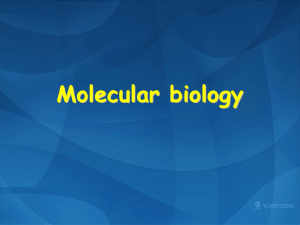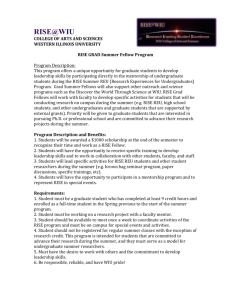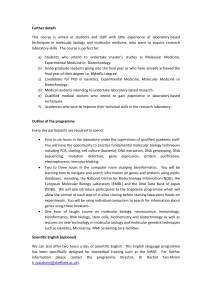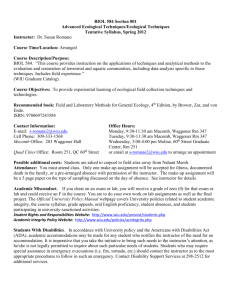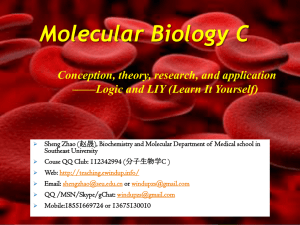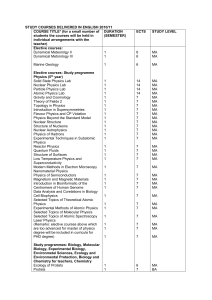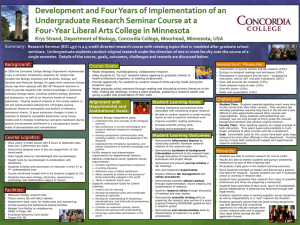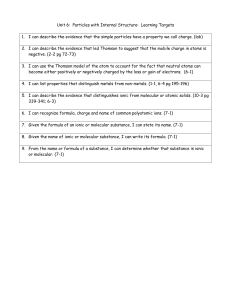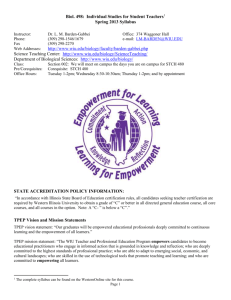biol 502 hum
advertisement
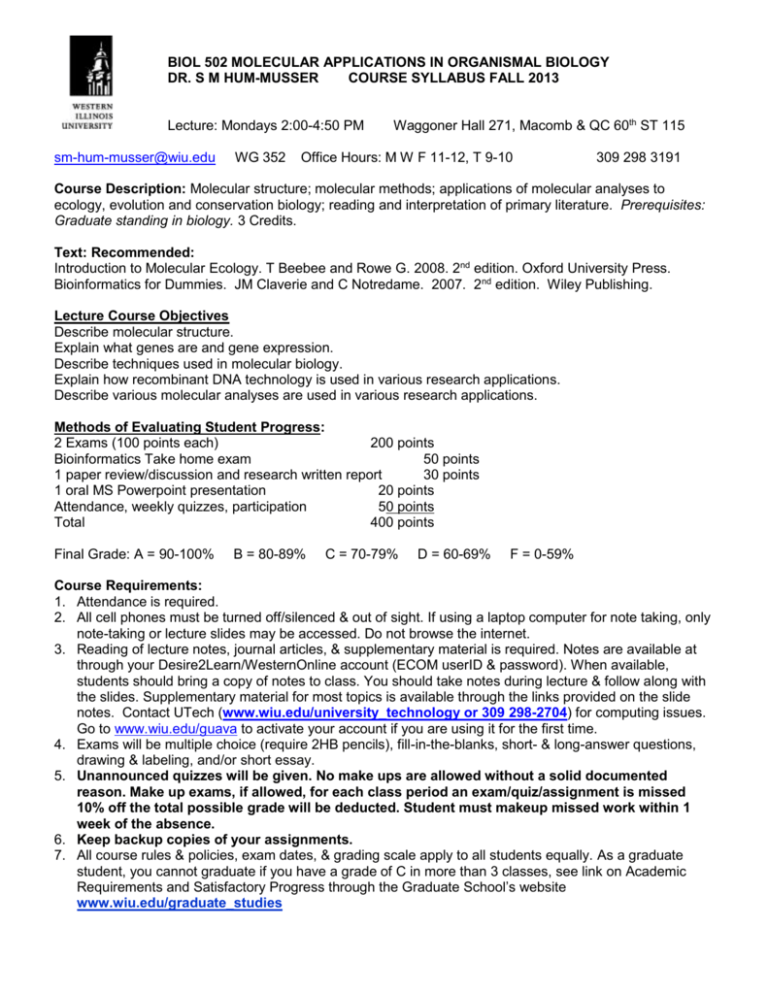
BIOL 502 MOLECULAR APPLICATIONS IN ORGANISMAL BIOLOGY DR. S M HUM-MUSSER COURSE SYLLABUS FALL 2013 Lecture: Mondays 2:00-4:50 PM sm-hum-musser@wiu.edu WG 352 Waggoner Hall 271, Macomb & QC 60th ST 115 Office Hours: M W F 11-12, T 9-10 309 298 3191 Course Description: Molecular structure; molecular methods; applications of molecular analyses to ecology, evolution and conservation biology; reading and interpretation of primary literature. Prerequisites: Graduate standing in biology. 3 Credits. Text: Recommended: Introduction to Molecular Ecology. T Beebee and Rowe G. 2008. 2nd edition. Oxford University Press. Bioinformatics for Dummies. JM Claverie and C Notredame. 2007. 2nd edition. Wiley Publishing. Lecture Course Objectives Describe molecular structure. Explain what genes are and gene expression. Describe techniques used in molecular biology. Explain how recombinant DNA technology is used in various research applications. Describe various molecular analyses are used in various research applications. Methods of Evaluating Student Progress: 2 Exams (100 points each) 200 points Bioinformatics Take home exam 50 points 1 paper review/discussion and research written report 30 points 1 oral MS Powerpoint presentation 20 points Attendance, weekly quizzes, participation 50 points Total 400 points Final Grade: A = 90-100% B = 80-89% C = 70-79% D = 60-69% F = 0-59% Course Requirements: 1. Attendance is required. 2. All cell phones must be turned off/silenced & out of sight. If using a laptop computer for note taking, only note-taking or lecture slides may be accessed. Do not browse the internet. 3. Reading of lecture notes, journal articles, & supplementary material is required. Notes are available at through your Desire2Learn/WesternOnline account (ECOM userID & password). When available, students should bring a copy of notes to class. You should take notes during lecture & follow along with the slides. Supplementary material for most topics is available through the links provided on the slide notes. Contact UTech (www.wiu.edu/university_technology or 309 298-2704) for computing issues. Go to www.wiu.edu/guava to activate your account if you are using it for the first time. 4. Exams will be multiple choice (require 2HB pencils), fill-in-the-blanks, short- & long-answer questions, drawing & labeling, and/or short essay. 5. Unannounced quizzes will be given. No make ups are allowed without a solid documented reason. Make up exams, if allowed, for each class period an exam/quiz/assignment is missed 10% off the total possible grade will be deducted. Student must makeup missed work within 1 week of the absence. 6. Keep backup copies of your assignments. 7. All course rules & policies, exam dates, & grading scale apply to all students equally. As a graduate student, you cannot graduate if you have a grade of C in more than 3 classes, see link on Academic Requirements and Satisfactory Progress through the Graduate School’s website www.wiu.edu/graduate_studies 8. Academic honesty is required. Cheating or plagiarism will result in 0 points for that exam/quiz/assignment. Students will conduct themselves with personal integrity & abide by the regulations in the WIU Policy manual (www.wiu.edu/provost/policies/) & this syllabus. You must be respectful of others, & actively participate. Breach of policy will be dealt with severely following the instructor’s discretion and direction of the University policy. 9. The time to be concerned about your grade is the first 14 weeks of class, not the last 2 weeks. 10. Learning is a group activity. The behavior of each person in class affects the learning outcomes of others. Definition of Plagiarism: “Plagiarism is the theft of someone else’s words, work, or ideas. It includes such acts as (1) turning in a friend’s paper & saying it is yours; (2) using another person’s data or ideas without acknowledgement; (3) copying an author’s exact words & putting them in your paper without quotation marks; & (4) using wording that is very similar to that of the original source but passing it off as entirely your own even while acknowledging the source.” V. E. McMillan in Writing Papers in the Biological Sciences (Bedford/St.Martin’s Press, New York, pg 16). This includes information in textbooks or laboratory manuals, honors & masters theses, all writing assignments, & images. Academic Accommodations - Notify the instructor of the need for an accommodation. Contact Disability Resource Center at 298-2512 for special assistance requirements in emergency evacuations (i.e. fire, tornado, etc.). Any changes to the schedule or syllabus will be announced in class and/or online through WesternOnline or WIU e-mail. Schedule Week 1 (8/19) – Introduction and review cells, genes, gene expression Week 2 (8/26) – Review Genetics, mutations, Recombinant DNA Technology Week 3 (9/2) – Labor Day Holiday Week 4 (9/9) – Molecular biology techniques Week 5 (9/16) – Molecular biology techniques continued Week 6 (9/23) – Exam 1 Week 7 (9/30) – Genomics, DNA microarrays Week 8 (10/7) – Genetic engineering and transformation Week 9 (10/15) – Population genetics, microsatellites, tree construction, relationships Week 10 (10/21) – Exam 2 Week 11 (10/28) – Bioinformatics, Sequence analysis, primer design Week 12 (11/4) – Bioinformatics, Sequence analysis, primer design continued Week 13 (11/11) – Bioinformatics Take home exam due, Student presentations Week 14 (11/18) – Student presentations Thanksgiving Break (11/25) Week 15 (12/2) – Student presentations Week 16 (12/9) – Student presentations -2-
